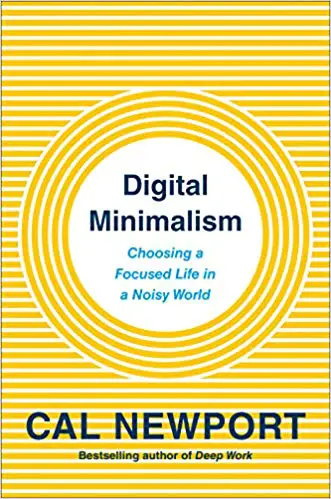We hope you love the books people recommend! Just so you know, The CEO Library may collect a share of sales or other compensation from the links on this page.
This book has 5 recommendations
Ryan Holiday (Media Strategist, Author, Founder/Brass Check)
The unassuming Georgetown computer science professor has become one of this generation’s leading voices on how we can all work more wisely and more deeply. With media consumption continuing to go way up (which, for most of us, means happiness and productivity continue to go way down) and the world becoming noisier every day, this book is an urgent call to action for anyone serious about being in command of their own life. The minimalism movement successfully led millions to opt out of the many possessions we’re told we’re supposed to crave and focus instead on the small number of things that bring the most meaning and value to our lives. The same ideology applies to our online lives. Digital clutter is stressful. We don’t need the constant connectivity, the pages and pages of apps, the incessant scrolling and clicking. New technologies can improve our lives if we know how to best leverage them. This book already helped me break my Facebook addiction—and the first month of the year has been a big improvement for me because of that.
Seth Godin (Marketer, Author, Entrepreneur)
You’re not the user, you’re the product. Hang up, log off, and tune in to a different way to be in the world. Bravo, Cal. Smart advice for good people.
Greg McKeown (Best-Selling Author of 'Essentialism')
I challenge you not to devour this wonderful book in one sitting. I certainly did, and I started applying Cal’s ideas to my own life immediately.
Charlamagne Tha God (Radio Presenter/The Breakfast Club)
This book is incredible. I’m a have to read it at least 3x and reference it forever. Disconnecting is very important because as the book says “Human Beings are not wired to always be wired.” A Silicon Valley whistle blower name Tristan Harris says “Is Silicon Valley programming apps or are they programming people?” They are programming people!!! Technology is not neutral, they want us to use it in particular ways and for long periods of time because that’s how the money is made.” It’s a whole lot of brain hacking going on, we are slaves to are smart phones and if you don’t think social media is bad for your mental health then you probably not paying attention to your mental health. The chapter “Spend Time Alone” breaks that all the way down. Smart Phones are a tool not a vital organ and if you think otherwise YOU NEED THIS BOOK. Thank Me Later.Brad Feld (Co-Founder/Foundry Group)
I’m an introvert in an extrovert’s world. I like to be alone. In contrast, I spend a large portion of my work time with groups. Figuring out how to manage this duality, while staying mentally healthy, has been a life-long challenge. Newport’s concept of digital minimalism helps me with all of this. Newport has an entire chapter on solitude, nicely titled “Spend Time Alone.” He makes the important distinction between spending time alone with other stimuli (music, podcasts, audible, streaming media) and real solitude. In addition to the framework around digital minimalism, Newport unloads on the reader with numerous tactics. I use some of them but found a few new ones to add to my repertoire.Amazon description
Minimalism is the art of knowing how much is just enough. Digital minimalism applies this idea to our personal technology. It's the key to living a focused life in an increasingly noisy world.
In this timely and enlightening book, the bestselling author of Deep Work introduces a philosophy for technology use that has already improved countless lives.
Digital minimalists are all around us. They're the calm, happy people who can hold long conversations without furtive glances at their phones. They can get lost in a good book, a woodworking project, or a leisurely morning run. They can have fun with friends and family without the obsessive urge to document the experience. They stay informed about the news of the day, but don't feel overwhelmed by it. They don't experience "fear of missing out" because they already know which activities provide them meaning and satisfaction.
Now, Newport gives us a name for this quiet movement, and makes a persuasive case for its urgency in our tech-saturated world. Common sense tips, like turning off notifications, or occasional rituals like observing a digital sabbath, don't go far enough in helping us take back control of our technological lives, and attempts to unplug completely are complicated by the demands of family, friends and work. What we need instead is a thoughtful method to decide what tools to use, for what purposes, and under what conditions.
Drawing on a diverse array of real-life examples, from Amish farmers to harried parents to Silicon Valley programmers, Newport identifies the common practices of digital minimalists and the ideas that underpin them. He shows how digital minimalists are rethinking their relationship to social media, rediscovering the pleasures of the offline world, and reconnecting with their inner selves through regular periods of solitude. He then shares strategies for integrating these practices into your life, starting with a thirty-day "digital declutter" process that has already helped thousands feel less overwhelmed and more in control.
Technology is intrinsically neither good nor bad. The key is using it to support your goals and values, rather than letting it use you. This book shows the way.
Get this book on Amazon | Barnes & Noble | Book Depository | iBooks
See more books recommended by
Ryan Holiday, Seth Godin, Greg McKeown, Charlamagne Tha God, Brad Feld
See more books written by
Sources
- If You Only Read a Few Books in 2019, Read These
- Digital Minimalism - book blurbs
- Charlamagne Tha God on Instagram
- Book: Digital Minimalism





